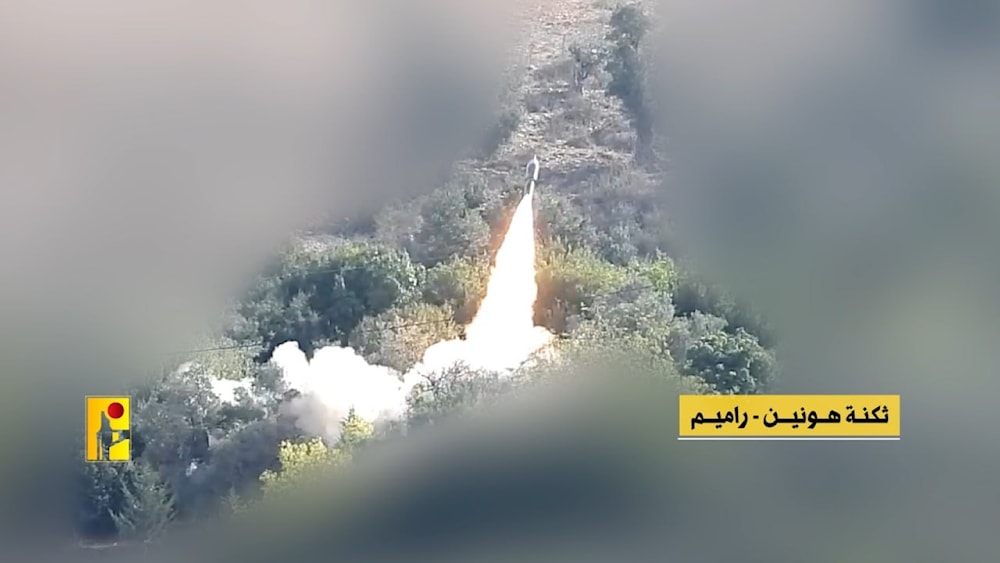Israeli settlers fearful of Hezbollah's Radwan Force, Burkan rockets
The "Israel-Alma" research center highlights the multifaceted results of Hezbollah's firing of rockets that weigh half a ton, including the devastating effects it had on Israeli military sites.
-

A screengrab published by the Military Media of the Islamic Resistance in Lebanon shows a Burkan rocket being launched at the Hounin-"Ramim" Israeli barracks, on November 11, 2023. (Islamic Resistance in Lebanon/ Telegram)
Hezbollah's use of the Burkan rocket artillery to target Israeli military sites in northern occupied Palestine is a significant advancement in the types of weapons used by the Islamic Resistance, the "Israel-Alma" research center said on Friday.
Burkan rockets are cheap, effective, and numerous within the Hezbollah arsenal, having a few thousand that carry up to 500 kg of explosives each. Hezbollah has the ability to produce them domestically since Syria's CERS center passed them the knowledge: https://t.co/JhZwVSB7ts
— Israel-Alma (@Israel_Alma_org) November 24, 2023
The article written by Yaakov Lappin highlights the results of Hezbollah's use of the rocket artillery, which boasts a payload of 300-500 kg of explosive material.
Lappin said the use of the weapon "serves as a reminder of [Hezbollah's] ability to threaten [Israel]."
"This kind of firepower and with warheads of this size" raises doubts about the ability of evacuated settlers from northern settlements to return to their colonial outposts, according to Lappin.
Read more: Gaza ceasefire deal does not include Lebanon: Israeli media
Iron Dome ineffective against cheap Burkan rockets
In the article published by Alma, Lappin said the only way to ensure the return of settlers to the north is by pushing out Hezbollah's special operations unit, the Radwan Force.
Lappin then highlighted Hezbollah operations on Israeli military sites, in which the Burkan-type rockets were utilized.
"On November 4, Hezbollah fired Burkan-type rockets at a military base in the north of the country. On November 20, Hezbollah [claimed] responsibility for firing Burkan rockets at the IDF's Biranit Barracks in the north. The attack did not cause any casualties, but it did cause great [material] damage [at the site of impact."
The Lebanese Islamic Resistance has lately deployed new weapons and tactics in its latest round of confrontations with “Israel” in response to the Israeli massacres against civilians in #Gaza and the killing of Lebanese civilians.
— Al Mayadeen English (@MayadeenEnglish) November 22, 2023
One of them is the Burkan rockets. Here's what… pic.twitter.com/FJkO5lfPv2
"Burkan rockets are cheap, effective, and numerous within the Hezbollah arsenal, having a few thousand that carry up to 500 kg of explosives each. Hezbollah has the ability to produce them domestically," Alma highlighted in a post on X.
Moreover, Lappin said the rocket has a destruction radius of 150 meters from its point of impact, covering a significant area. He also asserted that the production of a single rocket costs between $300 and $400.
"The Burkan can be used by Hezbollah to fire on IDF forces maneuvering in Lebanese territory," especially in residential areas, Lappin said in reference to a possible "all-out war", which would see Israeli occupation forces invade Lebanese territories, according to him.
He also highlighted the challenge that Israeli air systems face when attempting to track and intercept these short-range rockets.
In support of Palestine: Hezbollah expands scope of operations
Earlier on November 20, the Islamic Resistance in Lebanon announced that its fighters had targeted the "Biranit" Barracks, the headquarters of the "91st Division", with four heavy-caliber Burkan rockets, in solidarity with the Palestinian people and to affirm support for their Resistance amid the ongoing Israeli aggression.
In his latest appearance on November 11, Hezbollah Secretary-General Sayyed Hassan Nasrallah unveiled, during a ceremony commemorating Martyr's Day, that Hezbollah was using the renowned Burkan missiles against the Israeli occupation. "The Islamic Resistance in Lebanon began using 'Burkan' rockets, which weigh up to half a ton, in its operations."
"The operations of the Islamic Resistance in Lebanon in the depth of the occupied territories have increased," he added.
Despite the threats to Lebanon and the opposition of some "abnormal" voices to the Resistance's operations, "There is a general stance in Lebanon of solidarity with Gaza and support or understanding for Resistance operations," the leader of the Lebanese Resistance movement affirmed

 4 Min Read
4 Min Read










